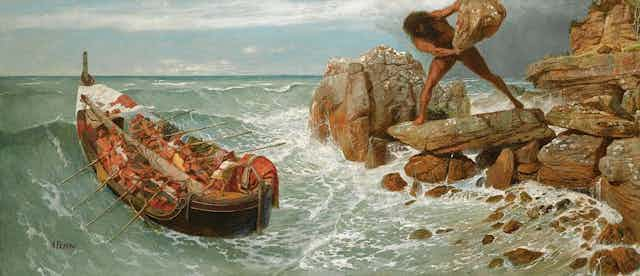Troy, a new BBC adaptation of Homer’s Iliad, shows the enduring interest we have in Ancient Greek myths. Today, Homer’s epic works remain both politically and ethically relevant. The Greek poet’s insight into why law and legality matter is particularly enlightening in the context of contemporary debates about immigration, which loom large amid the rise of right-wing populism on both sides of the Atlantic.
Those who object to immigration and demonise immigrants argue that the West’s legal traditions are endangered by lawless migrants who are incapable of peaceful integration.
But Homer helps us see that the politicians and tabloid press who repeat and reinforce this narrative suffer from a bad case of political illiteracy. Kindness to strangers is a cornerstone of the West’s tradition of political thought about legality.
Although legality and justice are not necessarily the same, the prevalent view in the West has always been – at least until recently – that justice is the main reason why laws matter at all. For example, at the time of the French Revolution, the French were well aware of law’s failures of justice when it came to protecting their freedom and equality. Yet, the post-revolutionary recipe to achieve greater justice was not less law, but clearer, more general, better administered laws.
Hospitality in the Odyssey

This same association between legality and justice can be found all the way back to the origins of Western political thought about the rule of law. In the Odyssey, Homer’s second epic poem, legality is centred around fulfilling the duties of hospitality towards strangers. Odysseus, tossed from shore to shore on his eventful journey back to his home, Ithaca, constantly asks himself where he has landed. He wonders if the inhabitants of each land he reaches are lawless, violent, savage; or rather god-fearing and friendly to strangers. For Homer, lawlessness is the opposite of kindness to strangers.
In the Odyssey, having laws and being civilised means taking seriously the duties of hospitality, through giving assistance and gifts to strangers. In contrast, being lawless and savage means refusing strangers the rites of hospitality, or, worse, abusing them. In the poem, the starkest example of this lawless savagery is the Cyclops Polyphemus. When Odysseus’s companions land on an unknown island and become trapped inside the Cyclops’s cave when they go exploring, he feasts upon them. Odysseus himself, with a few of his men, escapes this fate: he blinds Polyphemus and manages to leave the cave when the Cyclops lets out his flock of sheep.
It is not by accident that managing the relationship between host and stranger well is the most significant test of justice in the Odyssey, and that Zeus himself – the Greek world’s top deity – was the protector of strangers. There is a profound asymmetry in social power between host and stranger. A host is embedded in a community, which brings with it material and intangible advantages. A vulnerable stranger isn’t.
The message that justice and legality are measured by how you treat strangers is reinforced at every turn in the Odyssey, including at its end. When Odysseus finally makes it back to Ithaca against overwhelming odds, Athena disguises him as an old and frail stranger. But he is shamelessly abused by royal pretenders, who have been camping out in his royal palace and wooing Penelope, the Queen, in an attempt to seize power. They make fun of the old supplicant, throw a stool at him, and encourage another homeless beggar to turn against him for their own amusement. Odysseus, with the help of his son Telemachus, exacts bloody revenge upon them.
The opposite of xenophobia

By depicting foreigners in general – and certain ethno-religious groups such as Romanians, Muslims or Mexicans in particular – as a threat to the West’s tradition of legality, populist anti-immigration rhetoric betrays the very foundations of that tradition. It obscures that tradition’s roots in an aspiration to justice, whose centrepiece must be – as it was in Homer – kindness to strangers, not xenophobia.
The Homeric universe is a curious place. Gods can be fickle and petty; heroes owe their superhuman status less to magnanimity than magnificence. But some of the ways in which Homer challenges our convictions are serious, not quaint. Read today, the Odyssey turns on its head the contemporary belief – taken to its extreme by the logic of right-wing populism – that hospitality is purely a matter of charity, rather than a duty required by justice. For Homer there are no outsiders to justice. He reminds us that kindness to strangers lies at the very heart of our faith in the value of having laws.

